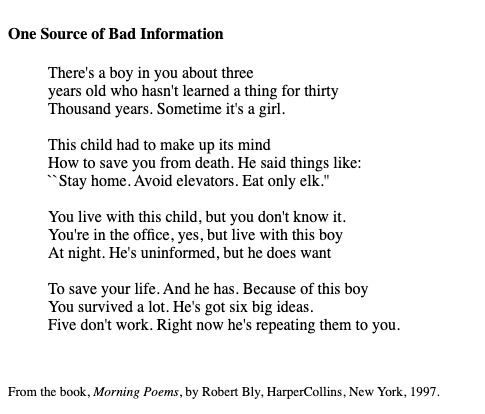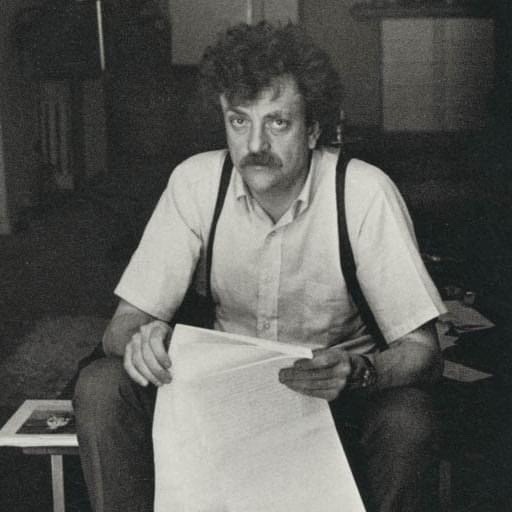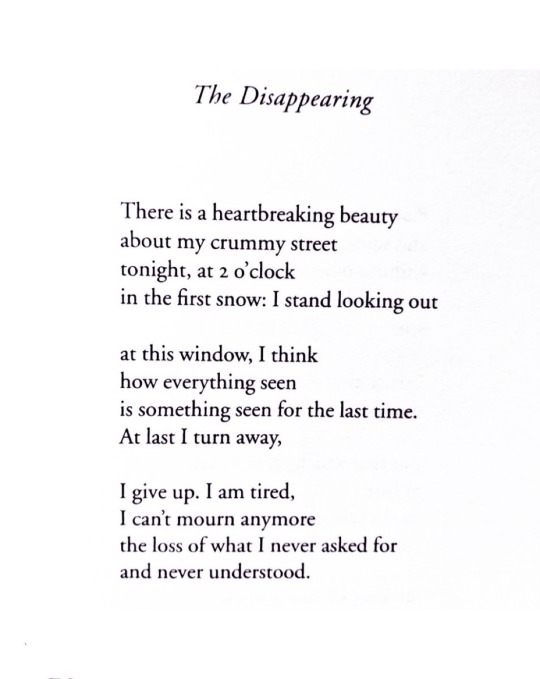Text

Lindsay Tigue, from "Code"
928 notes
·
View notes
Text

Vermin
"What do you want to be when you grow up?" What child cries out, ‘An exterminator!’? One diligent student in Mrs. Taylor’s class will get an ant farm for Christmas, but he’ll not see industry; he’ll see dither. "The ant sets an example for us all," wrote Max Beerbohm, a master of dawdle, "but it is not a good one." These children don’t hope to outlast the doldrums of school only to heft great weights and work in squads and die for their queen. Well, neither did we. And we knew what we didn’t want to be: the ones we looked down on, the lambs of God, blander than snow and slow to be cruel.
-- William Matthews, from The New Yorker
1 note
·
View note
Text
Keeping Quiet
by Robert Bly
A friend of mine says that every war Is some violence in childhood coming closer. Those whoppings in the shed weren’t a joke. On the whole, it didn’t turn out well.
This has been going on for thousands Of years! It doesn’t change. Something Happened to me, and I can’t tell Anyone, so it will happen to you.
868 notes
·
View notes
Text
"To read only children's tales..."
by Osip Mandelstam tr. Robert Chandler
To read only children’s tales and look through a child’s eye; to rise from grief and wave big things goodbye.
Life has tired me to death; life has no more to offer. But I love my poor earth since I know no other.
I swung in a faraway garden on a plain plank swing; I remember tall dark firs in a feverish blur.
537 notes
·
View notes
Text
The Poet Dreams of the Mountain
by Mary Oliver
Sometimes I grow weary of the days, with all their fits and starts. I want to climb some old gray mountain, slowly, taking the rest of my lifetime to do it, resting often, sleeping under the pines or, above them, on the unclothed rocks. I want to see how many stars are still in the sky that we have smothered for years now, a century at least. I want to look back at everything, forgiving it all, and peaceful, knowing the last thing there is to know. All that urgency! Not what the earth is about! How silent the trees, their poetry being of themselves only. I want to take slow steps, and think appropriate thoughts. In ten thousand years, maybe, a piece of the mountain will fall.
769 notes
·
View notes
Text
I Am Learning to Abandon the World
by Linda Pastan
I am learning to abandon the world before it can abandon me. Already I have given up the moon and snow, closing my shades against the claims of white. And the world has taken my father, my friends. I have given up melodic lines of hills, moving to a flat, tuneless landscape. And every night I give my body up limb by limb, working upwards across bone, towards the heart. But morning comes with small reprieves of coffee and birdsong. A tree outside the window which was simply shadow moments ago takes back its branches twig by leafy twig. And as I take my body back the sun lays its warm muzzle on my lap as if to make amends.
810 notes
·
View notes
Photo

[Image ID: The poem “One Source of Bad Information”, by Robert Bly. There’s a boy in you about three years old who hasn’t learned a thing for thirty Thousand Years. Sometime it’s a girl. The child had to make up its mind How to save you from death. He said things like: “Stay home. Avoid elevators. Eat only elk.” You live with this child, but you don’t know it. You’re in the office, yes, but live with this boy At night. He’s uninformed, but he does want To save your life. And he has. Because of this boy You survived a lot. He’s got six big ideas. Five don’t work. Right now he’s repeating them to you.
/end id]
24K notes
·
View notes
Text
In 2006 a high school English teacher asked students to write a famous author and ask for advice. Kurt Vonnegut was the only one to respond - and his response is magnificent: “Dear Xavier High School, and Ms. Lockwood, and Messrs Perin, McFeely, Batten, Maurer and Congiusta:
I thank you for your friendly letters. You sure know how to cheer up a really old geezer (84) in his sunset years. I don’t make public appearances any more because I now resemble nothing so much as an iguana.
What I had to say to you, moreover, would not take long, to wit: Practice any art, music, singing, dancing, acting, drawing, painting, sculpting, poetry, fiction, essays, reportage, no matter how well or badly, not to get money and fame, but to experience becoming, to find out what’s inside you, to make your soul grow.
Seriously! I mean starting right now, do art and do it for the rest of your lives. Draw a funny or nice picture of Ms. Lockwood, and give it to her. Dance home after school, and sing in the shower and on and on. Make a face in your mashed potatoes. Pretend you’re Count Dracula.
Here’s an assignment for tonight, and I hope Ms. Lockwood will flunk you if you don’t do it: Write a six line poem, about anything, but rhymed. No fair tennis without a net. Make it as good as you possibly can. But don’t tell anybody what you’re doing. Don’t show it or recite it to anybody, not even your girlfriend or parents or whatever, or Ms. Lockwood. OK?
Tear it up into teeny-weeny pieces, and discard them into widely separated trash recepticals. You will find that you have already been gloriously rewarded for your poem. You have experienced becoming, learned a lot more about what’s inside you, and you have made your soul grow.
God bless you all!
Kurt Vonnegut

Nimbus Publishing and Vagrant Press Goose Lane Editions Breakwater Books Ltd. The Acorn Press Bouton d'or Acadie Canada Council for the Arts | Conseil des arts du Canada
63K notes
·
View notes
Text
Birds
for Hanif Abdurraqib
The day my grandmother fled her homeland, a thousand birds blackened the sky like night. That’s not true, but I never know what to say
to call you close. In their 1676 volume Ornithologiae, Francis Willughby and John Ray developed the first classification
of birds. Oh, bird. What will I do with you? Everything I write, a way of saying: look what I can do
with language. I am trying to tell you: I miss wonder. I wonder if nostalgia is what we invented to name ourselves species
and mean: we once stood on the same shore. If history were as brackish as what thrashes in us, how could we possibly worship our reflections? Show me
an animal who has built a god from such roiling waters. In my house, a stiller mirror. Some say glass is liquid moving very, very slowly. Speed it up
and, there, the ocean, like the one my grandmother watched the birds dive into—headfirst, all at once. Once, a woman fell in love
with a bird. She spent her whole life removing power lines and painting glass doors. Stay with me. I just want us to see
what we are crashing into. In 1758, Carl Linneas modified Ornithologiae to devise the taxonomic system currently in place. Classification
is a country. If the pens of white men had fallen differently, we might share a homeland. I might be a bird.
-- Claire Schwartz
3 notes
·
View notes
Text
Ripeness
Ripeness is what falls away with ease. Not only the heavy apple, the pear, but also the dried brown strands of autumn iris from their core.
To let your body love this world that gave itself to your care in all of its ripeness, with ease, and will take itself from you in equal ripeness and ease, is also harvest.
And however sharply you are tested -- this sorrow, that great love -- it too will leave on that clean knife.
-- Jane Hirshfield
1 note
·
View note
Text
The problem with any first sentence, said Joan Didion, is that you're stuck with it. Everything else is going to flow out of that sentence. And by the time you've laid down the first two sentences, your options are all gone. Before beginning, too many options. Then, in the next breath, none. When you can't sleep, goes an old cure for insomnia, start telling yourself the story of your life. For some reason, writer's block has always felt to me like a kind of insomnia. I like that Norman Mailer said there's a touch of writer's block in a writer's work every day. I don't remember who said, Insomnia is the inability to forget. When you're having trouble writing, get up, go out, take a walk in the street. You will discover that certain streets exist precisely for this purpose. Once, I saw a man---homeless by the look of him---digging through the trash. He pulled out a couple of sheets of newspaper, examined them, and threw them back. Fishing deeper, he hauled up a magazine, squinted at the cover, and threw it back. Shit, he said, walking away. There ain't nothing to read in these fucking cans anymore.
Sigrid Nunez, The Vulnerables (Riverhead Books, 2023)
10 notes
·
View notes
Text
[image id]
There is a heartbreaking beauty about my crummy street tonight, at 2 o'clock in the first snow: I stand looking out at this window, I think how everything seen is something seen for the last time. At last I turn away, I give up. I am tired, I can't mourn anymore the loss of what I never asked for and never understood
[/id]

franz wright
8K notes
·
View notes
Text

Mosab Abu Toha, "The Moon", published at The New York Review, March 21, 2024. You can also read it at his Instagram here
568 notes
·
View notes
Text
“Somebody says draw a map. Populate it with the incidents of your childhood. Mark the spot where the lake receded after a winter of light snow. The stairs on which someone slapped you. The place where the family dog hung itself by jumping over the back fence while still on the dog run, hours later its body like a limp flag on a windless day. Draw a map, someone says. Let yourself remember. In the refugee camp a hundred thousand strong draw the stony outcrop from which you could no longer see the plume of smoke that was your village. Draw a square for the bathroom stall where Grandpa hid each day in order to eat his one egg free from the starving eyes of his classmates, an X for the courthouse where you and he were naturalized, a broken line for the journey. Draw a map, Jon says. Let it be your way into the poem. Here is where that plane filled with babies crashed that I was not on. Here is where I was ashamed. On the second floor at Pranash University the people wait their turn. Have you drawn your map, Jon asks. He has rolled up his sleeves. Forty-five minutes to noon the Prince stands up and says that the monks must be excused. We watch them file out, saffron robes as if their bodies have burst into blossom. Draw a map. Fly halfway around the globe. Here is the room next to the library where you realize how poor your tradition is, the local people with poetic forms still in use that date back to the time of Christ. Tell us about your map. Explain how these wavy lines represent the river, this rectangle the school-turned-prison where only seven escaped with their lives. This is my map. This star the place where I sat in a roomful of people among whom not one was not touched by genocide. Every last map resplendent with death though nobody knows where their loved ones lie buried. How many times can I appropriate a story that is not mine to tell? The woman stands up and says she is not a poet, that she doesn’t have the words. She points to a triangle on a piece of paper. Here is the spot where she found human bones in the well of her childhood home, and how her mother told her don’t be afraid because it was not the work of wild animals.”
— “Loose Strife,” by Quan Barry
#quan barry#theme: memory#theme: violence#theme: immigrants#theme: life#theme: trauma#tw: animal death
695 notes
·
View notes
Text
The children are always ours, every single one of them, all over the globe; and I am beginning to suspect that whoever is incapable of recognizing this may be incapable of morality. Or, I am saying, in other words, that we, the elders, are the only models children have. What we see in the children is what they have seen in us–or, more accurately perhaps, what they see in us.
- James Baldwin’s first piece for a national magazine, "Maxim Gorky as Artist," in The Nation (April 12, 1947)
2K notes
·
View notes
Text
[Image ID]
What we did to the earth, we did to our daughters one after the other.
What we did to the trees, we did to our elders stacked in their wheelchairs by the lunchroom door.
What we did to our daughters, we did to our sons calling out for their mothers.
What we did to the trees, what we did to the earth, we did to our sons, to our daughters.
What we did to the cow, to the pig, to the lamb, we did to the earth, butchered and milked it.
Few of us knew what the bird calls meant or what the fires were saying.
We took of earth and took and took, and the earth seemed not to mind
until one of our daughters shouted: it was right in front of you, right in front of your eyes
and you didn’t see. The air turned red. The ocean grew teeth.
[/id]

Marie Howe, "Postscript"
Poetry (May 2023)
187 notes
·
View notes
Text

-- George MacDonald
1 note
·
View note